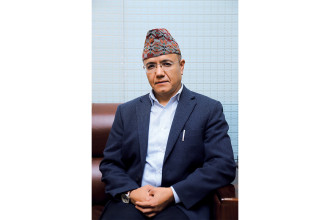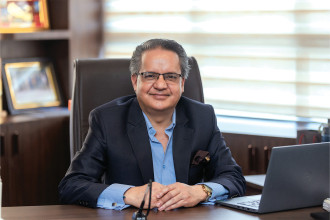-1733133604.jpg)
Born and raised in a small village in Darchula district, Gokarna Raj Awasthi, Director General of the Federation of Nepalese Chambers of Commerce and Industry, moved to Kathmandu after completing class 5 in the village. Awasthi says that his school years were very important as they taught him about discipline, perseverance and the value of education.
“I was fortunate to have supportive parents who encouraged me to pursue further studies. I eventually did an MBS which was a big step for me,” he ruminates. Awasthi also shares about the opportunity he had to complete a Postgraduate Diploma in Development Journalism at the Indian Institute of Mass Communication which exposed him to the wider world of journalism.
“I started my career as a journalist, and before that, I even worked as a teacher for a brief period of time. However, journalism quickly became my full-time pursuit, and I started with Artha Ko Artha, one of Nepal's longest-running television programmes,” he recalls. That experience, from 1997 onward, was transformative, he says, adding, “It shaped my understanding of economics and current affairs, as well as my passion for storytelling.”
In 2008, Awasthi joined Kantipur Daily as an economic journalist. He went on to become the head and editor of the Economic Bureau, a role he held for nearly a decade.
Later, Awasthi says that he also had the opportunity to work with the United Nations as an advisor to the UN Resident Coordinator's Office. For three years, he advised various UN agencies on Sustainable Development Goals. “Working in such a multicultural, multi-disciplinary environment gave me a global perspective on local issues, and I came to understand Nepal’s development challenges on a deeper level,” he says.
In 2020, Awasthi transitioned to his current role with the Federation of Nepalese Chambers of Commerce and Industry. “My work has allowed me to use all the skills I have gathered over the years in journalism, public policy and communications to contribute to economic and social causes close to my heart,” he shares.
In this issue of Business 360, Awasthi talks about what leadership means to him.
How do you define leadership?
I would say that leadership is both an art and a responsibility. In many parts of Nepal, leadership is traditionally associated with politics or high-profile roles. But to me, leadership is much broader. It is about uniting people with a common vision, even if you are not in a formal position of power. Leadership is also about taking responsibility, which means guiding others through both successes and failures and ensuring that, as a team, everyone is aligned with the organisation’s mission.
In my career, whether in journalism, with the UN, or my current role, I have come to see that leadership is about service. It is about putting the organisation’s goals and the team's well-being above your personal ambitions. You are there to inspire, to provide clarity, and to support your team in realising their potential. That is why I believe leadership is not just about giving orders but about making sure everyone feels heard, valued and connected to a larger purpose.
Is leadership inborn or a quality developed over time?
That's a great question. I think it can be a combination of both. Some people may have natural tendencies that draw others to them – qualities like empathy, strong communication, or an ability to stay calm in crises. But, personally, I believe most of us grow into leadership through experiences. In my case, I did not set out to be a leader; it was a result of focusing on doing my work well, accepting responsibilities as they came, and adapting to the challenges in front of me.
Mentors and role models play a big part as well. They often help you see qualities in yourself that you might not recognise. For example, in journalism, I had a few mentors who challenged me to take on difficult stories, which in turn taught me resilience. Similarly, while working with the UN, I observed leaders from diverse cultures and backgrounds which showed me how leadership could look different depending on the context. So yes, some people may have an innate ability, but I believe experience, continuous learning and personal reflection are what make a leader truly effective.
Could you share an experience where your leadership abilities were tested?
Leadership is full of tests. One particular instance was during the Covid 19 pandemic. As you know, it was a time of immense uncertainty and fear. Many people looked to us for guidance and solutions, and there was a lot of pressure to make quick, often risky, decisions. We established an isolation centre which involved a degree of risk for everyone involved, including the board members and staff. But it was something we felt was necessary for the community.
At the same time, we had to manage the economic impact, both at an organisational level and for the wider community. Advocating for policy changes with government bodies, working with international organisations, and finding resources; all of it required quick thinking, collaboration and sometimes taking difficult stands. This experience taught me the value of courage in leadership and showed me how critical it is to be decisive yet flexible in challenging times.
-1733133618.jpg)
How do you view the relationship between a leader and their team?
The team is the backbone of any leader’s success. I firmly believe that no leader can achieve anything substantial alone. Every success I have had is because of the collective effort of the teams I have been part of. A leader’s role is to support, guide and sometimes shield the team from unnecessary pressures so they can focus on what they do best.
To me, a strong team is built on mutual trust and respect. It is important that team members feel they can approach me with ideas, concerns or even criticism. I believe in creating a space where everyone feels their contribution is valued. This approach not only strengthens the team but also leads to better decision-making since you are drawing on a diverse set of perspectives and skills. As a leader, fostering such an environment is one of the most important responsibilities.
How do you see leadership evolving, especially in the political and social sectors in Nepal?
That is an interesting question. Nepal is at a crossroads in many ways, and leadership across sectors needs to evolve to keep pace with our changing society and economy. For instance, we are seeing a lot of young talent leaving Nepal in search of opportunities abroad, which is creating a gap in leadership here. To address this, leaders will need to find ways to retain talent and encourage the next generation to invest in Nepal’s future.
Leadership will also need to become more inclusive and adaptable. Social and political leadership, in particular, must focus on involving youth and women, groups that have historically been underrepresented. As we adapt to global changes in technology and economy, Nepali leaders will need to embrace innovative solutions tailored to our unique challenges. I believe that if we cultivate a culture of inclusive, forward-thinking leadership, it could make a significant difference.
What is your personal leadership style? Has it changed over the years?
Yes, my style has evolved. Early in my career, I was more focused on doing the best work I could, and I was less conscious of my influence on others. However, as I took on roles with more responsibility, I realised the importance of being not just effective but also approachable and transparent.
Today, I would say my leadership style is collaborative and integrity-focused. I prioritise honesty, accountability and listening to others. I also work hard to be approachable because I think open communication builds a stronger team. My experiences in different sectors have shown me that adaptability is crucial; every situation, every team requires something different. So, I aim to be flexible while staying true to my core values of integrity and responsibility.
What are the most important qualities of a good leader?
Three qualities stand out to me: integrity, resilience and humility. Integrity is the foundation of trust. A leader without integrity cannot earn the genuine respect of their team, and that respect is crucial for effective leadership. Resilience is also essential because leadership inevitably involves setbacks. You need the strength to push through challenges and the ability to stay focused on the long-term vision.
Finally, humility allows a leader to recognise the strengths of others, listen to different perspectives, and learn from mistakes. Leaders are only human, and humility helps you connect with your team and continuously improve. I would also say continuous learning is vital – a leader who stops learning is a leader who stops growing.
Are there any leaders or role models who have inspired you?
Many, actually. Globally, leaders like Nelson Mandela and Mahatma Gandhi come to mind. Mandela’s resilience in the face of adversity and his focus on unity are inspiring, especially in a country like Nepal, where unity is crucial for progress. Closer to home, I have great respect for some senior journalists who mentored me in my early years and taught me the importance of dedication and integrity in one’s work.
In the UN, I met people from diverse backgrounds who were deeply committed to making a positive difference, and that commitment inspired me. And, of course, I am inspired by my own parents, who instilled in me the values of hard work and perseverance. Leaders like these remind me that a good leader is driven by a purpose beyond personal success





-(1)-1752214965.jpg)